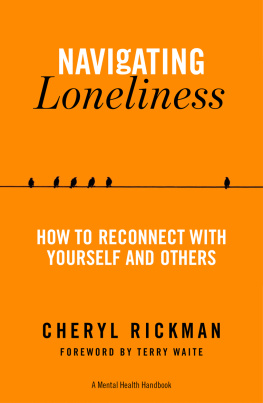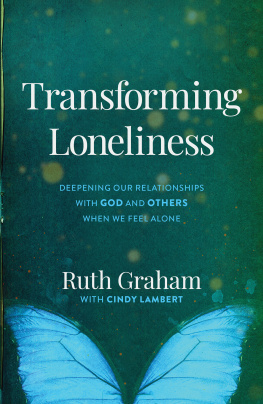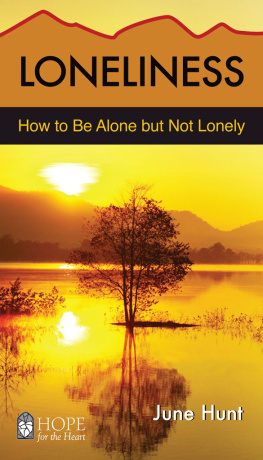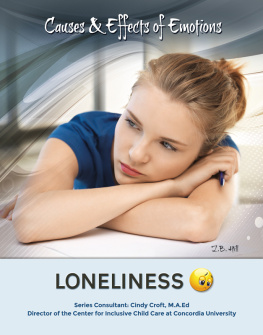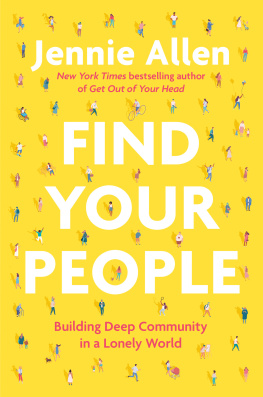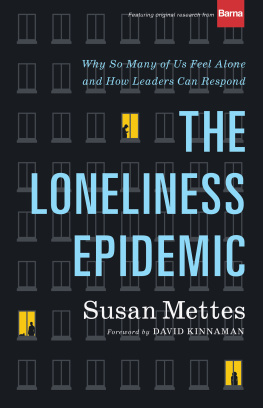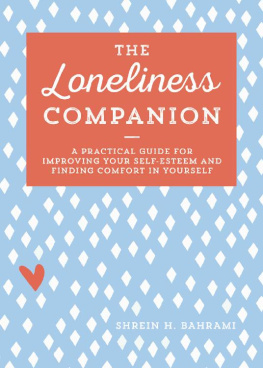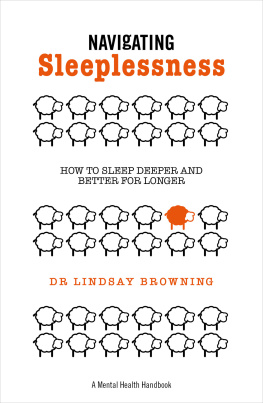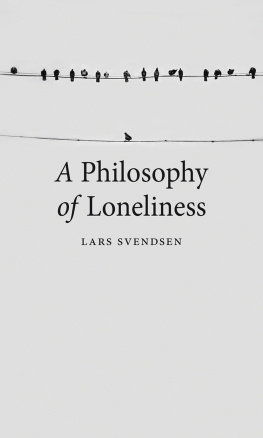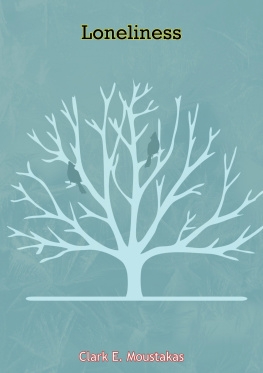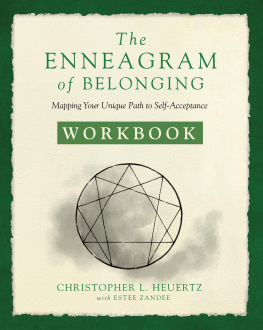Contents
Guide
Navigating Loneliness

ABOUT THE AUTHOR
Cheryl Rickman is a qualified Positive Psychology Practitioner and Sunday Times bestselling author and ghostwriter of twenty self-help, wellbeing and business books.
After her parents lives were cut short, Cheryl decided to devote her life to helping others make the most of their own precious lives through the books she writes.
She specializes in writing practical books to help people fret less and flourish more, and is a Wellbeing Ambassador for the Network of Wellbeing.
Having qualified with a Certificate in Applied Positive Psychology in 2016, Cheryl also runs wellbeing retreats and delivers workshops on acceptance, balance and compassion, The ABC of Flourishing.
Cheryl lives with her husband, daughter and two dogs in a country cottage in Hampshire, UK. She is an unashamed tree-hugger and nature-lover, has an overflowing bookshelf and her favourite colour is rainbow. She loves pizza and the seaside, but is not a fan of mushrooms or spiders.
You can find out more at www.CherylRickman.co.uk
OTHER WELLBEING BOOKS BY THIS AUTHOR
Be More Wonder Woman: Fearless Thinking from a Warrior Princess (DK, 2020)
The Flourish Colouring Book: Art Therapy Mindfulness (CreateSpace, 2015)
The Flourish Handbook: How to Achieve Happiness with Staying Power, Boost Your Well-Being, Enjoy Life More and Reach Your Potential (CreateSpace, 2013)
The Happiness Bible: An Ultimate Guide to Sustainable Wellbeing (Godsfield Press, 2019)
The Little Book of Resilience (Gaia, 2019)
The Little Book of Serenity (Gaia, 2020)
May You Be Well: Everyday Good Vibes for the Spiritual (Pyramid, 2021)
You Are Enough: Embrace Your Flaws and Be Happy Being You (Summersdale, 2021)
Navigating Loneliness
How to Connect with Yourself and Others
A Mental Health Handbook
Cheryl Rickman

A Trigger Book
Published by Welbeck Balance
An imprint of Welbeck Publishing Group
20 Mortimer Street
London W1T 3JW
First published by Welbeck Balance in 2021
Copyright Cheryl Rickman, 2021
Cheryl Rickman has asserted her right under the Copyright, Designs and Patents Act, 1988, to be identified as the Author of this work.
All rights reserved. No part of this publication may be reproduced, stored in a retrieval system, or transmitted in any form or by any means, electronically, mechanical, photocopying, recording or otherwise, without the prior permission of the copyright owners and the publishers. A CIP catalogue record for this book is available from the British Library
eBook ISBN 9781789562736
Typeset by Lapiz Digital Services
Note/Disclaimer
Welbeck Balance encourages diversity and different viewpoints. However, all views, thoughts, and opinions expressed in this book are the authors own and are not necessarily representative of Welbeck Publishing Group as an organisation. All material in this book is set out in good faith for general guidance; no liability can be accepted for loss or expense incurred in following the information given. In particular, this book is not intended to replace expert medical or psychiatric advice. It is intended for informational purposes only and for your own personal use and guidance. It is not intended to diagnose, treat or act as a substitute for professional medical advice. The author is not a medical practitioner nor a counsellor, and professional advice should be sought if desired before embarking on any health-related programme.
www.welbeckpublishing.com
To friendship the kind others give me and the kind I have learned to give myself.
FOREWORD
I am approaching my eighty-second year as I sit down to write this foreword. For the moment I am alone and therefore have the opportunity to look back across the years and reflect on a multitude of experiences. Friends tell me that I have had a most unusual life, and in some respects, I suppose, that is true. I have travelled to virtually every part of the world and lived in several countries.
Often I have been alone in dangerous and demanding situations where I have had to face acute danger and sometimes look death in the eye. Those experiences were nothing compared to the inner loneliness that I felt long before I became a hostage. The fear of being alone in a vast universe. That loneliness would so capture me that I would be lost in its embrace. Only those who have known that depth of loneliness will know what I mean. The loneliness that can propel you down a myriad of blind alleys in search of a solution.
Then came captivity. Five years as a hostage. Totally alone without the possibility of even seeing another person, let along talking with them. I was frightened. Frightened that finally loneliness would overwhelm me and capture what remaining scraps of sanity I retained. Now it became a matter of survival. I had to deal with the problem otherwise it would deal with me and deliver a fatal blow.
It took me a long time to realize that the real key to dealing with the problem lies within. One has to look deep within ones inner being with all its faults and contradictions and learn to accept, and yes, even love oneself. It is not an easy process. No one can truly conduct an honest self-examination without realizing that there is a dark side to their nature. That is true for every human being.
Slowly, during those long years of isolation, I had to learn how to accept myself. I had to realize that I could not totally obliterate the negative side of my personality, but that I could work towards greater inner harmony and thus be more content within myself. This led to a releasing of creative forces that I never realized that I had. It also led to being able to convert loneliness into creative solitude. I realized that loneliness is a state of mind and could be dealt with.
It is my hope that this handbook will guide you towards that pathway.
Terry Waite
November 2020
CONTENTS
INTRODUCTION: YOU ARE NOT ALONE
There are people all around us. Everywhere. Eight billion of us co-exist on this planet. But that doesnt stop us from feeling lonely.
An estimated 9 million people in the UK, more than three in five Americans (61 per cent)
Such statistics provide evidence that, if you ever feel lonely, (rather ironically) you are not alone in feeling that way, whatever your social situation.
Millions of elderly people worldwide have been found to go at least five days a week without seeing or speaking to anyone, saying the television is their main source of company.
Living Alone
Headlines about a loneliness epidemic have been a regular feature in the media for some time now, mainly due to global demographics and health surveys reporting that approximately one quarter of all homes are now lived in by a single occupant. This figure has tripled since the 1940s, according to the US Census Bureau, with 40 per cent of city homes now single-occupancy due, in part, to a rise in divorce, a decrease in people getting married and a rise in the number of people choosing to remain single.

